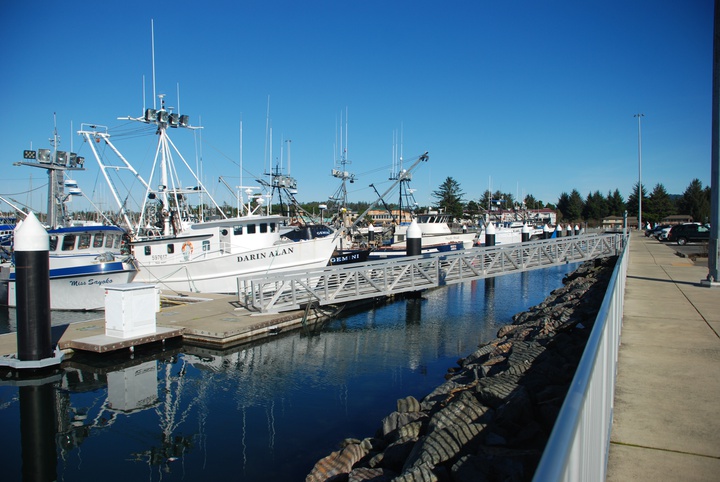Jessica Cejnar Andrews / Friday, Dec. 10, 2021 @ 5:23 p.m. / Local Government, Ocean
Growing Impatient Over Ongoing Dredging Obstacles, Harbor Commissioner Hired Diver to Conduct His Own Inspection

A full inner boat basin at the Crescent City Harbor last month. Photo: Jessica C. Andrews
Previously:
###
Growing impatient with what they view as a lack of progress over dredging at the Crescent City Harbor, commissioners on Tuesday said they wanted to take their case directly to the State Water Resources Control Board at its first meeting next month.
One commissioner, Harry Adams, who was elected to the Harbor District board last year, even hired Crescent City-based diver Kenneth Gray to find out how bad conditions were near the docks around Fashion Blacksmith, the local shipyard.
“He gave me a 5 gallon bucket of this stuff,” Adams told the Wild Rivers Outpost, describing the silt that’s accumulated near the shipyard’s synchrolift. “Basically in the last five or six years it’s built up 5 feet against the bank where Fashion Blacksmith lowers their lift, preventing them from getting it down. It’s just frustrating.”
Adams, who paid $150 for Gray’s services, said he and the other newcomer on the Harbor District Board, Gerhard Weber, volunteered to go to the Water Resources Control Board to convince them to grant the port a permit to dispose of 10 years of accumulated fine silt and soil in its dredge ponds.
Finding a viable disposal site for that material is the only obstacle standing between the Crescent City Harbor District and its ability to resume dredging in the inner and outer boat basins, including the docks around Fashion Blacksmith. But because the Water Quality Control Board classifies such material as solid waste it can’t be deposited in a regular landfill.
At the Harbor District’s Nov. 16 meeting, Harbormaster Tim Petrick said he was working with PlanWest Partners, of Arcata, to obtain permits for a diver to dredge around Fashion Blacksmith. The most immediate concern was turbidity testing by the Water Resources Control Board, Petrick told commissioners.
On Tuesday, Petrick said he was continuing working on obtaining a diver dredge permit, adding that he hopes to have some more exact information about how long that process would take at the Harbor District’s Dec. 21 meeting.
Weber and Adams expressed frustration at this.
“At the last meeting we have discussed that we would all write a letter to the Water Board expressing our emergency situation,” Weber said. “Some of us would actually go to the Water Board and present in person just to re-emphasize how important it is for our area to get a quick approval of our needs. Where do we stand with this? What are we waiting for? Are we waiting for some information to write this letter?”
Weber called on his colleagues to volunteer to attend the Water Resource Control Board meeting, saying he wanted to make the district’s request as “official as possible and as public as possible.”
Along with Adams, Commissioners Wes White and Brian Stone also volunteered to attend the Water Resource Control Board meeting.
On Thursday, Petrick said the Harbor District is working with engineers to obtain a beneficial use permits from the Water Resources Control board to find a use for the spoils in the dredge ponds rather than disposing of them.
“We are working on getting the Water Board permits and the Army Corps permits, but it’s a process you have to go through,” he told the Outpost. “It’s not something you can just snap your fingers and get and I think sometimes that is what people feel like we should do. Now we’re making progress.”
Adams said the material in the port’s dredge pond can be used by local contractors. He noted that the material Gray dredged around Fashion Blacksmith was “pretty fluffy” with different grades of texture as well as plant and animal material. Adams said he plans to have that material analyzed.
Adams, a commercial fisherman, said he was worried about how the accumulated silt affected Fashion Blacksmith’s ability to refit the area’s commercial fishing fleet, particularly in the middle of Dungeness crab season.
“Crescent City is the Dungeness capital of California. On most years there’s more crab caught out of the port of Crescent City than the whole state combined,” he said. “Is Fashion Blacksmith important? Oh hell, yes!”
CLICK TO MANAGE